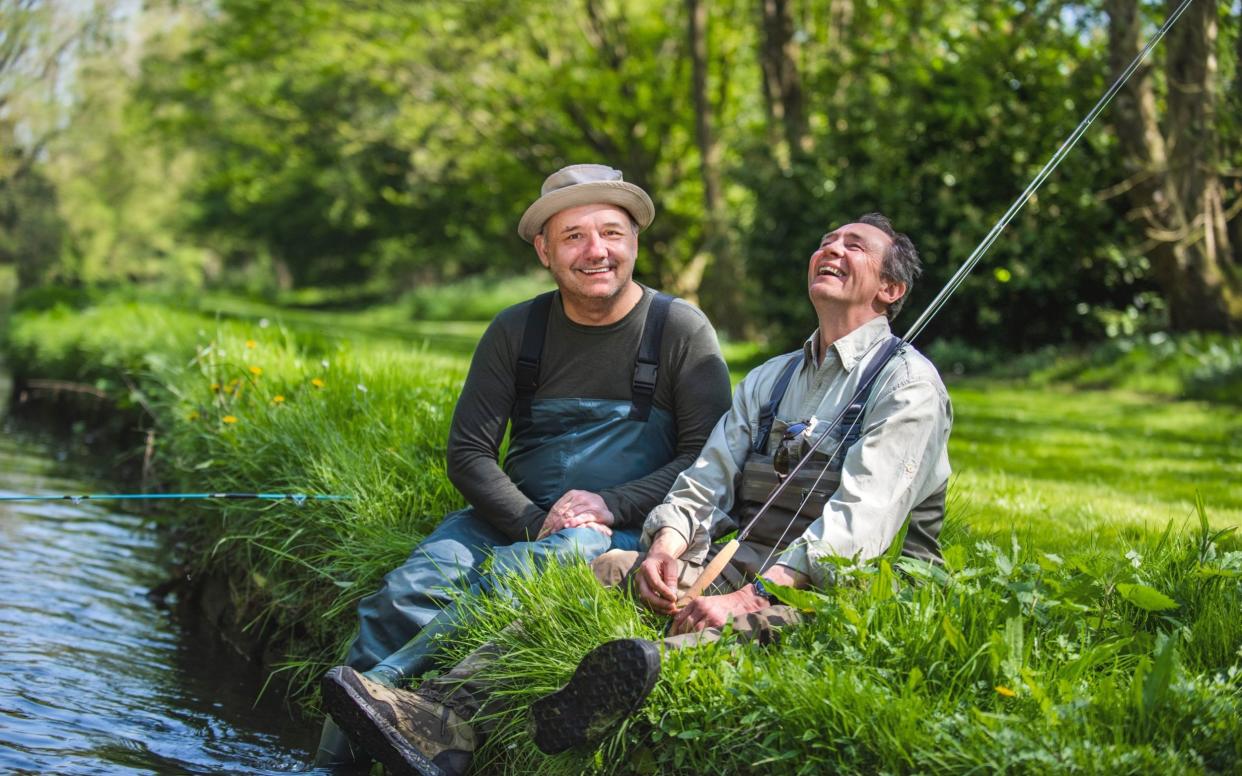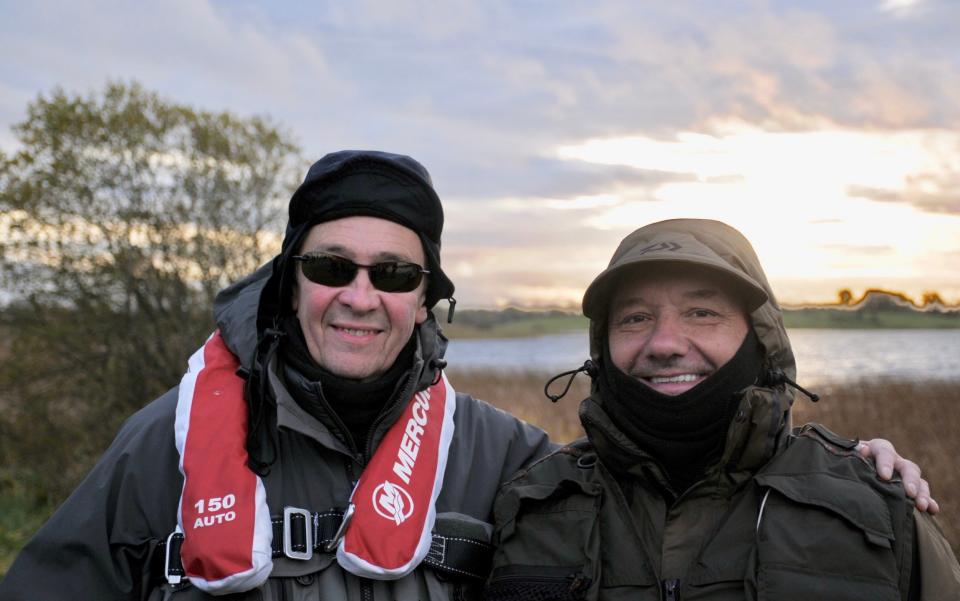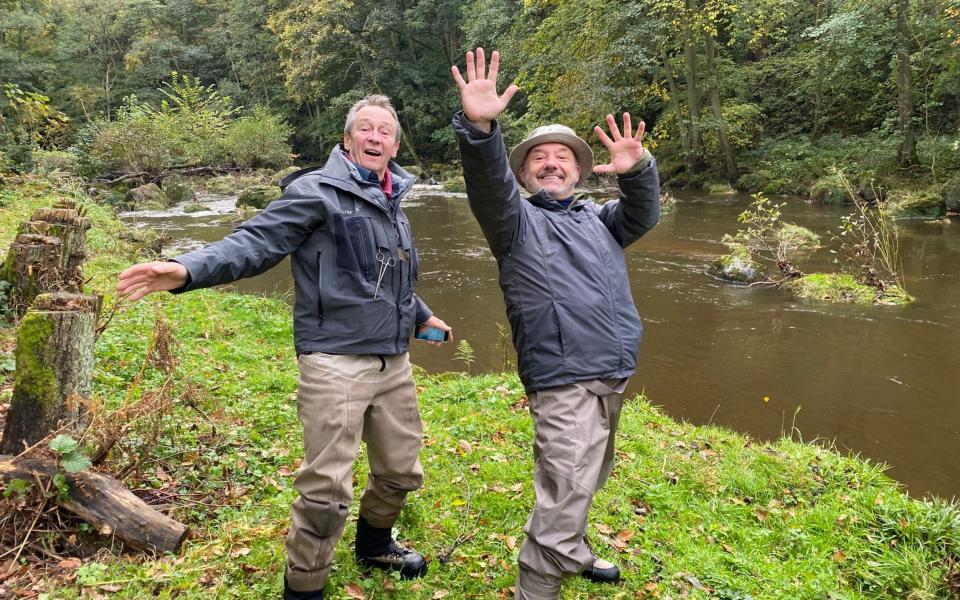Bob Mortimer: 'Paul Whitehouse was the first friend I've talked to about losing my dad'

- Oops!Something went wrong.Please try again later.
- Oops!Something went wrong.Please try again later.
When Paul Whitehouse sees a mince pie, he feels “the obligation to eat something I don’t really like”. Most aspects of modern Christmas strike him as “gaudy, pointless and superficial”. And on a video link from his decoration-free sitting room he tells me that he had a neon sign reading “Bah Humbug” commissioned about a decade ago and regrets not having it mass-produced and marketed, because “I’d have made a fortune”.
But the 62-year-old star of The Fast Show merrily concedes that the festive bonhomie in a special Christmas edition of his and Bob Mortimer’s hit series, Gone Fishing, is “genuine and heartfelt”. This will be no surprise to the show’s millions of devoted fans. Although the men themselves say it’s “just two old geezers stood on a riverbank chatting, sometimes with a dog, occasionally catching a fish”, it’s the cockle-warming authenticity of the stars’ friendship that has won viewers’ hearts.
The Christmas special sees the pair returning to Mortimer’s home town of Middlesbrough. Filmed in a Covid bubble with their small production team, the hour-long show finds them casting their lines for winter favourites trout, grayling, pike and (offshore) cod, while Christmas-loving Mortimer tries to jolly his Grinchy pal into the seasonal spirit by forcing him to hang baubles on the Christmas tree and eat Brussels sprouts.
Over three series and hundreds of hours of filming, the pair have become so adept at bickering and bantering with each other that it’s actually quite hard for me to get a word in when we all meet via the internet. They wave their respective snacks at their cameras. Whitehouse, who lives in north London with his partner Mine and their young daughter Delilah, has a banana, and 61-year-old Mortimer is eating a chocolate wafer in his home in Tunbridge Wells, which causes his friend to shake his head in disapproval: “Is that heart-healthy, Bob?”
It’s a reminder that the show grew out of the fishing trips the friends began taking together after they were both diagnosed with heart problems in 2015. Whitehouse had stents fitted and Mortimer had a triple bypass that left the already “reclusive” man depressed and retreating further from the world. Seeing him struggling, Whitehouse dragged Mortimer out to the river with some maggots, where they were both surprised to find themselves opening up.
“Paul is the first friend I’ve talked to about some big issues, like losing my dad,” says Mortimer, who lives with his wife Lisa and their two sons.

The comic was just six when his father was killed in a road traffic accident. “Quite late in life, I’ve gone through that process of realising: ‘S--t! Talking works!’ ” he says. “Which is funny,” nods Whitehouse, “because we’re not reeeeally that kind of bloke, are we? Hmm.”
Side by side, standing in the water in their waders, the two men have tackled everything from grief and depression to love and parenthood, as well as plenty of lighter subjects, including skincare regimes and the best way to serve potatoes. The programmes are never scripted and the conversation meanders as naturally as the currents around their wellies.
After a career built on comic caricatures, Whitehouse admits that when they started the first series he felt very self-conscious. “Neither of us was entirely comfortable being more normal on camera,” he says. “But if we tried to break into any of our old characters, it didn’t work.”
Actually, seeing the two men slough off the pressure to be funny is a huge part of the show’s appeal. Those of us who grew up watching their frenetic on-screen comedy are also slowing down and it’s surprisingly restful to watch them at ease, without all the effort we know went into the masks, wigs, accents and catchphrases. Mortimer says the show “taught me I don’t have to be the joker all the time. Because it’s been quite wearing, doing that for 30 years.”
As ever, when Mortimer gets serious, Whitehouse leaps in with faux‑sympathy and a furrowed brow: “You’re a bit tired, aren’t you, Bob, after all the laughter.” He says the way they do this to each other on the show reflects how men talk to each other in real life: “Express the feelings, then move on! You can’t spend your whole life wallowing. You need to laugh, and that’s just how we are.”
Whitehouse did feel pressure not to embarrass the angling community, though. “I got a trout quite early on. It was going great. But then Bob slipped over on the mud with the net and took me out. The pair of us were flat on our backs while I was playing this fish and all I could think was: ‘Anglers are going to hate the sight of these two clowns floundering about on the bank.’ ”
Mortimer admires his friend’s intense focus on the fishing, even though it can handicap their conversation.
“When he puts his line in, he can ignore everything I say. To make a show of it, I had to start bothering him. I would wander over and ask questions like: ‘Have you ever used a set square, Paul? Have you ever been to Leicester on your own?’ ”
He listens more attentively in the Christmas show. Particularly when Mortimer takes him to the park behind his childhood home and describes the moment he saw the police cars from across the grass and realised something terrible had happened.
“It was a very touching moment, standing there in that field,” says Whitehouse. “I felt like a kid, too. I felt like we’d just been out on our bikes, playing football and then you see this drama unfold. It felt like I saw that crack occur in your childhood.”
Mortimer nods. “Life diverted me from thinking about these things, but in the end, when you’re quiet again, you have to confront them. I thought I would be over losing my parents by now. I probably am… as such. But going back reminded me that the bond you have with your parents is extraordinary and Christmas is part of building that bond. I think it’s worth bearing with the sadness.”

Mortimer has spoken often about the way he used food to comfort himself through his childhood grief. He became his mother’s “little kitchen helper” and would put as many as 17 spoons of sugar in his tea. Now, he says, he soothes himself with fishing, and Mortimer’s heart-healthy recipes are part of Gone Fishing’s nourishing appeal.
Unsurprisingly, the other topic that was unavoidable, when it came to the Christmas special, was coronavirus. Whitehouse had a mild case of it early in the year while still starring in Only Fools and Horses in the West End, and just assumed it was a cold.
“I didn’t want all the actors to think comedians were lightweights, so I just pushed through,” he says. “But [when] Bob and I reconvened at the end of May, I got tested and I had the antibodies. I nearly took out my family!”
It would have been odd not to talk about what a strange year it has been, especially since figures show the series was popular among viewers seeking solace during lockdown.
“People used to come up to us and just shout our catchphrases,” says Whitehouse. “Now they come up and say ‘Thank you for getting my dad to have his heart checked out’, or ‘Thank you for getting my husband to recognise his depression’.
“We’ve had to learn to take responsibility for that,” he adds. “We’ve had to become better people.”
Gone Christmas Fishing is on BBC Two on Sunday at 8.10pm

